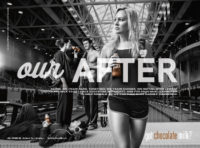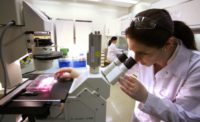New research suggests an effective recovery drink may already be in your refrigerator - low-fat chocolate milk. Grabbing low-fat chocolate milk after a tough workout helped give both trained and amateur athletes a post-exercise training advantage, according to three new studies presented at the American College of Sports Medicine and published in the Journal of Strength and Conditioning Research this month.
In three related studies, researchers at the University of Texas at Austin compared the recovery benefits of drinking low-fat chocolate milk after exercise to a carbohydrate beverage with the same calories (similar to a typical sports drink) and calorie-free beverages. The new research linked drinking low-fat chocolate milk after strenuous exercise to:
• Improved performance: Following an exhausting ride, trained cyclists had significantly more power and rode faster, shaving about six minutes, on average, from their ride time when they recovered with low-fat chocolate milk compared to a carbohydrate sports drink and calorie-free beverage. The 10 cyclists rode for 90 minutes at a moderate intensity followed by 10 minutes of high intensity intervals. During a four-hour recovery period, they drank one of the three recovery beverages immediately and two hours later before heading on a second 40 kilometer ride.
• Quicker exercise adaptation: Compared to the other recovery drinks, chocolate milk drinkers had twice the improvement in V02max – a measure of aerobic fitness and adaptation – after a 4.5-week cycling regimen that included intense exercise five days a week, followed by one of the three recovery beverages. The study included 32 healthy but untrained male and female cyclists.
• Better body composition (more muscle, less fat): Chocolate milk drinkers gained more muscle and lost more fat during training, with a 3-pound lean muscle advantage at the end of the 4.5 weeks compared to athletes who grabbed a carbohydrate drink. The 32 healthy but untrained male and female cyclists rode for one hour, five days a week and drank one of the three recovery beverages immediately following and one hour post-exercise.
"Collectively, our research suggests that low-fat chocolate milk – easily accessible for most athletes – can improve performance and aid training for trained and amateur athletes faced with tough routines," says John L. Ivy, lead researcher on the University of Texas at Austin studies. "We may need more research to understand the exact mechanisms, but there's something that chocolate milk naturally has that likely gives it the post-exercise advantage."
Experts agree the two-hour window after exercise is an important, yet often neglected, part of fitness routine. After strenuous exercise, this post-workout recovery period is critical for active people at all fitness levels to help make the most of a workout and stay in top shape for the next workout.
Chocolate milk – nature's recovery drink
Low-fat chocolate milk naturally has many of the nutrients most commercial recovery drinks have to add in the lab, including high-quality protein and key electrolytes such as calcium, potassium, sodium and magnesium. Plus, it has B vitamins for energy and the combination of five bone-building nutrients – calcium, vitamin D, phosphorus, protein and potassium – to help athletes build and maintain strong bones and reduce risk for stress fractures.
Low-fat chocolate milk also contains high-quality protein to help repair and rebuild muscles after strenuous exercise. This new research adds to a growing body of evidence suggesting milk is an effective way to help athletes refuel and recover.
Refuel with chocolate milk resources and grants
Visit Facebook.com/ChocolateMilkRefuel and read about the latest news and research around post-exercise nutrition. Athletes can also vie for one of 100 Refuel Grants at www.RefuelwithChocolateMilk.com through Jan. 15, 2012. Individual athletes and athletic groups who give it their all and then refuel with chocolate milk can apply for a shot at joining athletes like Apolo Ohno (American short track speed skating competitor and eight-time Olympic medalist), Chris Bosh (NBA player) and Dara Torres (American international swimmer and Olympic gold medalist) on Team Refuel and receive a $250 Individual Athlete Refuel Grant or a $500 Athletic Group Refuel Grant. Plus, all grant recipients score Team Refuel training gear.
About the National Milk Mustache "got milk?" campaign
The Milk Processor Education Program (MilkPEP), Washington, D.C., is funded by the nation's milk processors who are committed to increasing fluid milk consumption. The National Fluid Milk Processor promotion board, through MilkPEP, runs the National Milk Mustache "got milk?" campaign, a multi-faceted campaign designed to educate consumers about the health benefits of milk. For more information, go to www.whymilk.com.
Get our new eMagazine delivered to your inbox every month.
Stay in the know on the latest dairy industry trends.
SUBSCRIBE TODAYCopyright ©2024. All Rights Reserved BNP Media.
Design, CMS, Hosting & Web Development :: ePublishing


